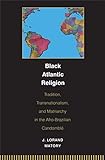Black Atlantic Religion : Tradition, Transnationalism, and Matriarchy in the Afro-Brazilian Candomblé / J. Lorand Matory.
Material type: TextPublisher: Princeton, NJ : Princeton University Press, [2009]Copyright date: ©2005Edition: Course BookDescription: 1 online resource (392 p.) : 17 halftones. 2 line illusContent type:
TextPublisher: Princeton, NJ : Princeton University Press, [2009]Copyright date: ©2005Edition: Course BookDescription: 1 online resource (392 p.) : 17 halftones. 2 line illusContent type: - 9780691059440
- 9781400833979
- 299.6/73
- BL2592.C35
- online - DeGruyter
- Issued also in print.
| Item type | Current library | Call number | URL | Status | Notes | Barcode | |
|---|---|---|---|---|---|---|---|
 eBook
eBook
|
Biblioteca "Angelicum" Pont. Univ. S.Tommaso d'Aquino Nuvola online | online - DeGruyter (Browse shelf(Opens below)) | Online access | Not for loan (Accesso limitato) | Accesso per gli utenti autorizzati / Access for authorized users | (dgr)9781400833979 |
Browsing Biblioteca "Angelicum" Pont. Univ. S.Tommaso d'Aquino shelves, Shelving location: Nuvola online Close shelf browser (Hides shelf browser)

|

|

|

|

|

|

|
||
| online - DeGruyter Philosophy of Language / | online - DeGruyter What Is Meaning? / | online - DeGruyter Kierkegaard's Journals and Notebooks, Volume 3 : Notebooks 1-15 / | online - DeGruyter Black Atlantic Religion : Tradition, Transnationalism, and Matriarchy in the Afro-Brazilian Candomblé / | online - DeGruyter Trying Leviathan : The Nineteenth-Century New York Court Case That Put the Whale on Trial and Challenged the Order of Nature / | online - DeGruyter Social and Economic Networks / | online - DeGruyter The Shifting Grounds of Race : Black and Japanese Americans in the Making of Multiethnic Los Angeles / |
Frontmatter -- Contents -- List of Illustrations -- Introduction -- Chapter One. The English Professors of Brazil On the Diasporic Roots of the Yorùbá Nation -- Chapter Two. The Trans-Atlantic Nation Rethinking Nations and Transnationalism -- Chapter Three. Purity and Transnationalism On the Transformation of Ritual in the Yorùbá-Atlantic Diaspora -- Chapter Four. Candomblé's Newest Nation: Brazil -- Chapter Five. Para Inglês Ver Sex, Secrecy, and Scholarship in the Yorùbá-Atlantic World -- Chapter Six. Man in the "City of Women" -- Chapter Seven. Conclusion. The Afro-Atlantic Dialogue -- Appendix A. Geechees and Gullahs The Locus Classicus of African "Survivals" in the United States -- Appendix B. The Origins of the Term "Jeje" -- Notes -- Bibliography -- Index
restricted access online access with authorization star
http://purl.org/coar/access_right/c_16ec
Black Atlantic Religion illuminates the mutual transformation of African and African-American cultures, highlighting the example of the Afro-Brazilian Candomblé religion. This book contests both the recent conviction that transnationalism is new and the long-held supposition that African culture endures in the Americas only among the poorest and most isolated of black populations. In fact, African culture in the Americas has most flourished among the urban and the prosperous, who, through travel, commerce, and literacy, were well exposed to other cultures. Their embrace of African religion is less a "survival," or inert residue of the African past, than a strategic choice in their circum-Atlantic, multicultural world. With counterparts in Nigeria, the Benin Republic, Haiti, Cuba, Trinidad, and the United States, Candomblé is a religion of spirit possession, dance, healing, and blood sacrifice. Most surprising to those who imagine Candomblé and other such religions as the products of anonymous folk memory is the fact that some of this religion's towering leaders and priests have been either well-traveled writers or merchants, whose stake in African-inspired religion was as much commercial as spiritual. Morever, they influenced Africa as much as Brazil. Thus, for centuries, Candomblé and its counterparts have stood at the crux of enormous transnational forces. Vividly combining history and ethnography, Matory spotlights a so-called "folk" religion defined not by its closure or internal homogeneity but by the diversity of its connections to classes and places often far away. Black Atlantic Religion sets a new standard for the study of transnationalism in its subaltern and often ancient manifestations.
Issued also in print.
Mode of access: Internet via World Wide Web.
In English.
Description based on online resource; title from PDF title page (publisher's Web site, viewed 30. Aug 2021)


